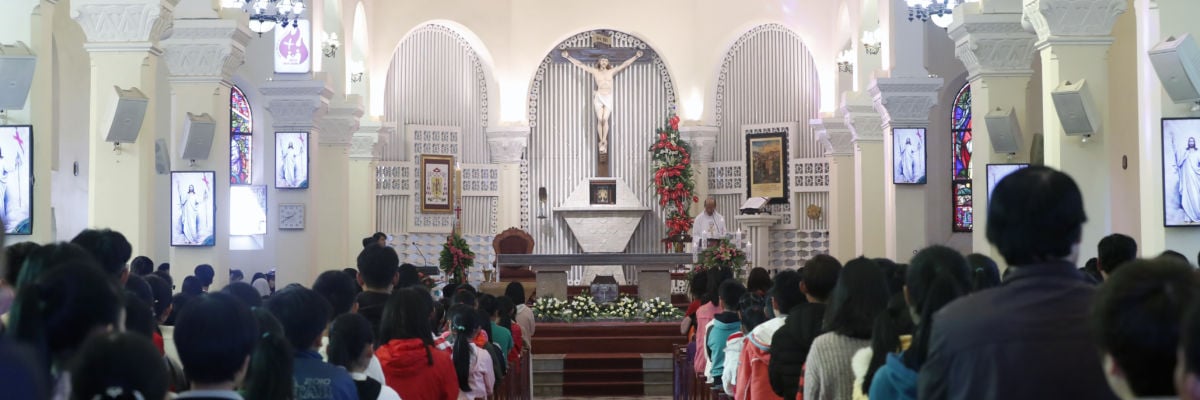
Many Seventh-Day Adventists were at World Youth Day 1993 to try to pull Catholics out of the Church. Adventists believe the Catholic Church to be the Whore of Babylon spoken of in Revelation 18:4, where a heavenly voice cries out against the Whore, saying, “Come out of her, my people, lest you share in her sins, and lest you receive of her plagues.” Adventists conclude they must exhort people to leave Catholicism to escape divine wrath. [The identification of the Church as the Whore of Babylon is also a theme found in much anti-Catholic literature from non-Adventist Protestants. But one cannot identify the Church as the Whore of Babylon since Rev. 18:20-24 shows God judges the Whore to avenge the apostles and prophets (v. 20) because “in her was found the blood of prophets and saints, and of all who have been slain on the earth” (v. 24). But the Catholic Church never killed apostles or prophets. Indeed, anti-Catholics continually claim that the Catholic Church did not even exist in the apostolic age.].
One reason they would suffer God’s wrath if they did not leave, Adventists believe, is that they have accepted the mark of the Beast (Rev. 13:16-17). Adventists claim this mark is worshipping on Sunday. Since Catholics worship on Sunday, this makes them minions of Antichrist. To be saved, they must leave the Church and worship on Saturday instead. This is why the Adventists are called Seventh-Day Adventists—they claim that one must keep the Jewish sabbath by worshipping on Saturday, the seventh day of the week, rather than on Sunday, the first day of the week. [Belief in Saturday worship has been shared by a few non-Adventist groups; in fact, the Adventists acquired it from a nineteenth century group of Seventh-Day Baptists].
In Judaism the sabbath (Hebrew, “rest”) was a day of the week God set aside for the Jews to rest and worship. The weekly sabbath was one of three kinds of holy days on the Jewish calendar. The other two were the monthly new moons and the seven yearly festivals (Neh. 10:33, Lev. 23, Num. 29:6). Because of the Jewish way of reckoning time, according to which the new day began at sunset rather than midnight, the sabbath actually began at sundown on Friday and lasted until sundown on Saturday (though some Adventists do not realize this and celebrate Saturday from midnight to midnight, according to the modern way of reckoning days).
Identifying Sunday worship as the mark of the Beast is exegetically impossible. Revelation 13:16-18 pictures the mark as a number on the foreheads or right hands of the Beast’s worshippers and states it corresponds to a man’s name (v. 17).
Adventists agree that the mark is also the number of a man’s name. They argue that one of the pope’s supposed titles—they invariably give Vicarius Filii Dei, which means “Vicar of the Son of God”—adds up to 666 in Latin numerals. [Vicarius = V(5) + I(1) + C(100) + I(1) + U (5) = 112, Filii = I(1) + L(50) + I(1) + I(1) = 53, Dei = D(500) + I(1) = 501. 112 + 53 + 501 = 666 (the remaining letters in the title have no numerical values in Latin)]. This argument fails because (1) Vicarius Filii Dei, although it adds up to 666, is not a title of the pope; (2) it is similar to one of his authentic titles, Vicarius Christi, which does not add up to 666; (3) the mark probably is the number of a man’s name, not a man’s title, and (4) many people’s names can be made to total 666. (It doesn’t follow that because a person’s name can be made to total 666 he is the beast.) But the most fundamental problem with the Adventist position is that Scripture pictures the mark of the beast as the number of a man’s name, not a day of the week.
Further convincing will be needed to get a Seventh-Day Adventist to give up his church’s teaching that Sunday worship is an invention of the apostate Catholic Church and that God requires one to worship on Saturday. I had a conversation with an Adventist at World Youth Day in which I presented him with an argument he found difficult to refute.
Since Jesus was the Son of Man, he had authority to change the sabbath if he wished. When his disciples were chastised for plucking grain on the sabbath (Mark 2:23-28), Christ pointed to an example from the life of David to justify the conclusion, “The sabbath was made for man, and not man for the sabbath. Therefore the Son of Man is also Lord of the sabbath” (v. 27-28).
Christ tells us the sabbath exists to meet the needs of man (for a day of worship and rest),[This is important since sabbatarians often cite passages such as Exodus 20:11 and 31:17, which parallel Israel’s sabbath with the Lord’s rest on the seventh day of Gen. 1, to prove the sabbath is a “creation ordinance,” something demanded by the way the universe was created. But Christ’s statement that the sabbath was made for man—to meet man’s needs for worship and rest—shows this is false. The reference to God’s rest is brought in as a parallel to argue, “Look, even God ceased from work. How much more should you, who actually need to cease from work!”] that the sabbath can be altered by human need (such as the disciples’ hunger), and that the Son of Man has the authority to alter it (as he did for the disciples). Christ both possessed and exercised the authority to change the sabbath. But was this change a permanent thing—something that extended beyond Christ’s own time?
The New Testament writers regarded Christ’s sayings about the Mosaic law as permanently binding. In Mark 7:19, the evangelist explains Christ’s statement concerning eating with unwashed hands to mean all foods were henceforth clean—a statement Seventh-Day Adventists need to take to heart since they are vegetarians.
We can verify that the apostles understood Christ’s coming as having made a permanent change in the sabbath by looking at Paul’s epistles. In Galatians 4:10, in the middle of his letter urging the Galatians not to subject themselves to the Law of Moses, Paul states, “[Y]ou have come to know God . . . how can you turn back again to the weak and beggarly elements, whose slaves you want to be once more? You observe days, and months, and seasons, and years! I am afraid I have labored over you in vain.” Paul thus worries about the Galatians keeping the Jewish festal calendar (including the sabbath), which would render his labor to save them vain (see Gal. 5:2-5).
In Colossians 2:14-16, Paul mentions the sabbath by name, stating that Christ has “canceled the bond which stood against us with its legal demands . . . Therefore let no one pass judgment on you in questions of food and drink or with regard to a festival or a new moon or a sabbath. These are only a shadow of what is to come; but the substance belongs to Christ.” Festivals, new moons, and sabbaths were the three kinds of feast days of the Mosaic calendar (see Neh. 10:33, Lev. 23, Num. 29:6). Paul thus states that the whole Jewish festal calendar, sabbath days included, is not binding on Christians.
Adventists try to bolster their position by pointing out that Paul often went to the synagogue on Saturday (Acts 13:14, 44, 18:4). Paul did this because his pattern was to preach the gospel to the Jews first and then to the Gentiles (Acts 13:46). By going to a synagogue on Saturday, he would be assured the opportunity to preach to a large number of Jews (as he did in Acts 13:15ff and 18:4).
By this Paul was doing what he always did, meet people on their own ground in order to win them to Christ. “For though I am free from all men, I have made myself a slave to all, that I might win the more. To the Jews I became as a Jew, in order to win Jews; to those under the [Mosaic] law I became as one under the law—though not being myself under the law—that I might win those under the law” (1 Cor. 9:19-20).
Going to the synagogue on Saturday was simply a shrewd evangelistic strategy on Paul’s part, not a binding command for all Christians. The fact Paul went to the synagogue on Saturday does nothing to change the fact that the sabbath is not binding since it was part of the law of Moses, which has passed away (Rom. 6:14, Col. 2:13-17).
Of course, the moral principles contained in the Old Testament law are still binding on us, including the moral principle behind the sabbath commandment. This was that we should set aside sufficient time for worship and rest. We no longer have to do this on Saturday, since the law of Moses is gone, but we still have to do it.
To ensure that people will set aside sufficient time for worship and rest, the Church has decreed that all Catholics must refrain from menial labor on Sunday and worship God by attending Sunday Mass. Exceptions to this law are made in cases of necessity, just as with the Old Testament sabbath law (see Matt. 12:11-12, 1 Macc. 2:38-41.) For example, for those who are obliged to work on Sunday, the Church permits attendance of an anticipatory Mass on Saturday instead.
By requiring Sunday worship the Church is simply following the lead of the apostles. There was clearly a day which the early Church considered specially consecrated to the Lord. John tells us that he wrote the book of Revelation because of a vision he saw “on the Lord’s day” (Rev. 1:10).
Elsewhere we learn which day that was. In 1 Corinthians 16:2, Paul tells his readers, “On the first day of every week, each of you is to put something aside and store it up, as he may prosper, so that contributions need not be made when I come.” Paul exhorts his readers to get their church’s contribution together ahead of time so it won’t have to be put together when he arrives (see 2 Cor. 9:3-5).
He tells them when to contribute to the gift: every first day of the week—every Sunday. Why? Because that is the day the early Church met for worship. Even though the Old Testament sabbath had passed away, the early Church commemorated Christ’s resurrection on Sunday, the first day of the week, because that was the day Christ arose (Mark 16:9, see also Mark 16:2 and Luke 24:1).
A Catholic can be confident he should worship on Sunday because that is what the apostles did since Christ, by his authority as the Son of Man, both had and used the power to change the sabbath.



